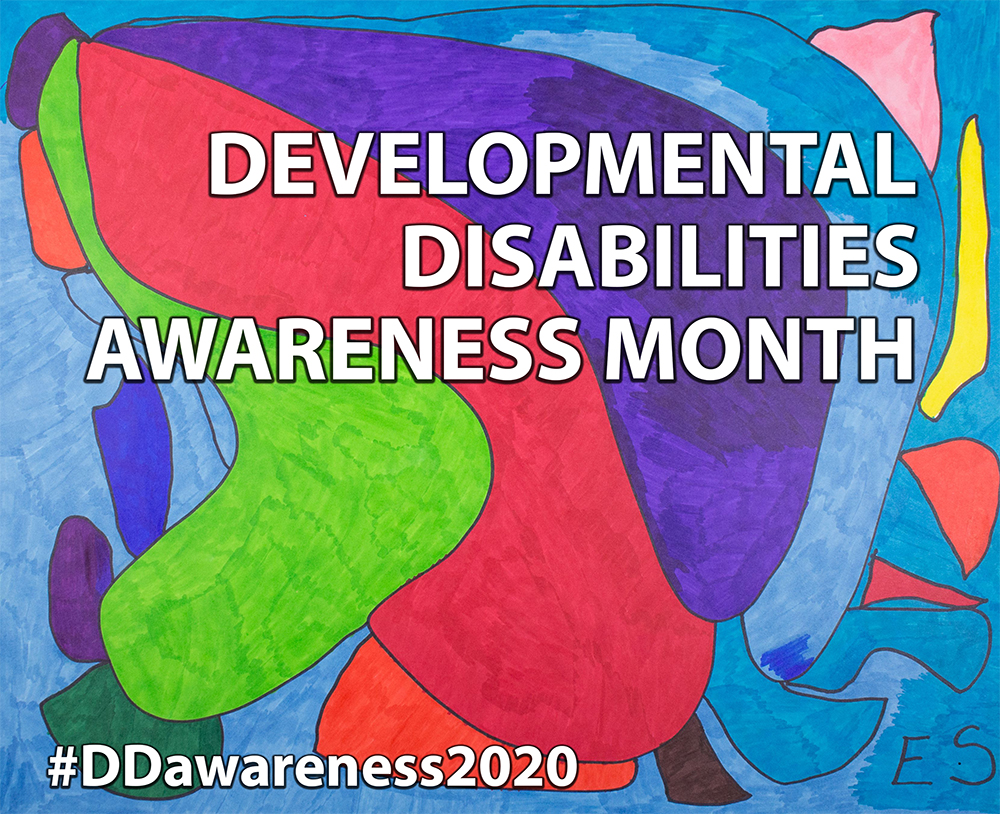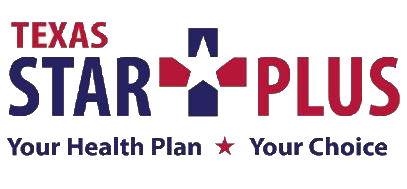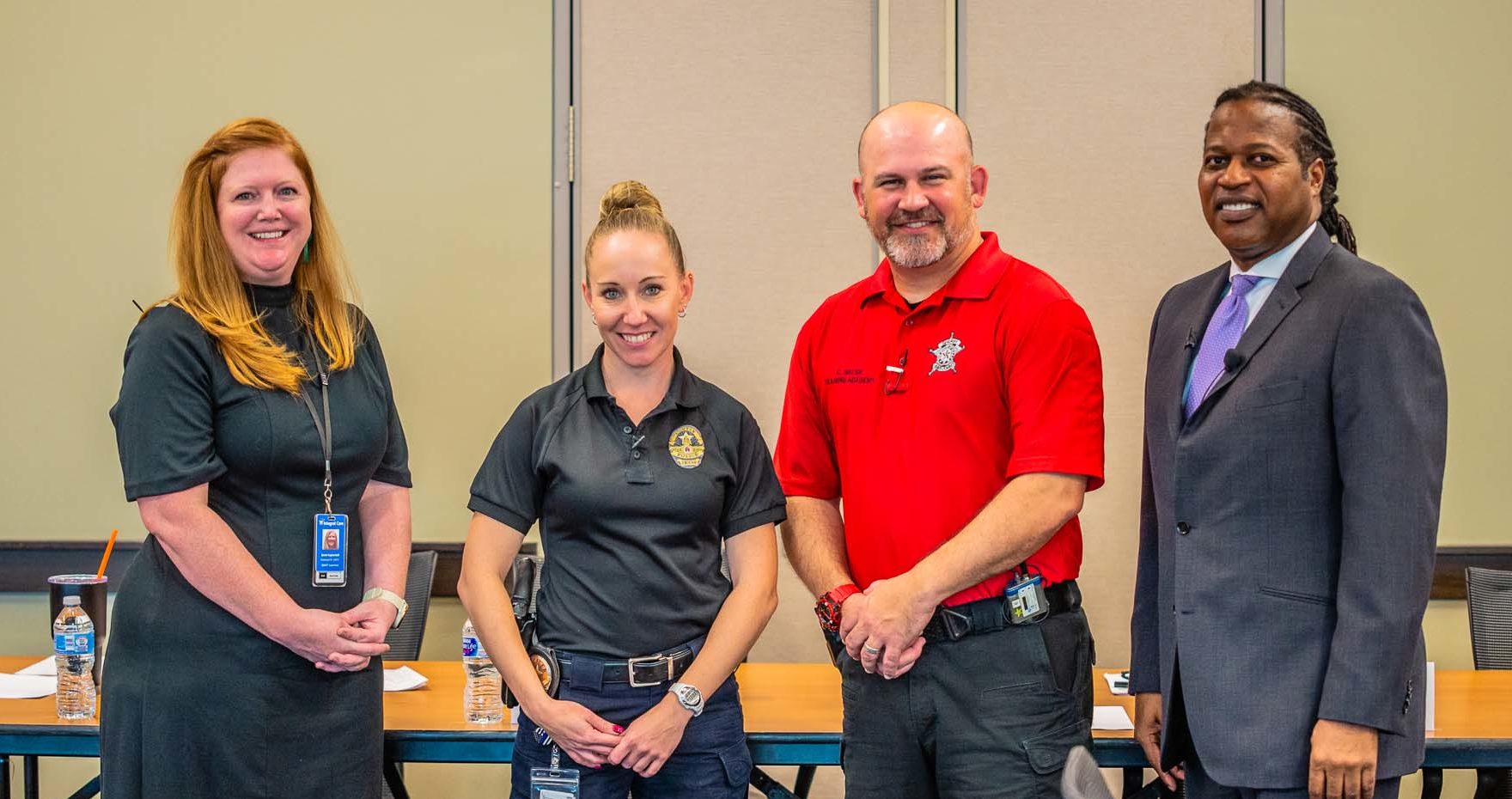TRANSPARENCIES
a monthly newsletter from Integral Care [printfriendly]
a monthly newsletter from Integral Care [printfriendly]
 March is National Developmental Disabilities Awareness Month, a time to educate our communities on the needs of people with intellectual and developmental disabilities (IDD) and reflect on the progress made toward improving their quality of life. Developmental disabilities are a group of conditions due to an impairment in physical ability, learning, language or behavioral challenges. These conditions begin during the developmental period, can impact day-to-day functioning and typically last throughout a person’s lifetime. While there is more work to be done, Texas made significant progress improving services for people with IDD during the 86th legislative session.
March is National Developmental Disabilities Awareness Month, a time to educate our communities on the needs of people with intellectual and developmental disabilities (IDD) and reflect on the progress made toward improving their quality of life. Developmental disabilities are a group of conditions due to an impairment in physical ability, learning, language or behavioral challenges. These conditions begin during the developmental period, can impact day-to-day functioning and typically last throughout a person’s lifetime. While there is more work to be done, Texas made significant progress improving services for people with IDD during the 86th legislative session.
Legislators filed over 100 IDD-related bills this past session, indicating high priority and increased interest. The budget appropriated funding to almost all IDD-related exceptional items, including $3 million for the 2020-21 biennium to provide outpatient mental health services. Exceptional items are priorities from the Health and Human Services Commission (HHSC) considered of high importance in addition to the base budget. One of these exceptional items, Exceptional Item 22, provides $1.5 million to support a Learning Collaborative to advise HHSC on best practice models and associated outcome measures that demonstrate success in providing specialized outpatient mental health services for people with IDD. Integral Care, along with four other Local IDD Authorities (LIDDAs), has been selected to participate in the Learning Collaborative.
 Another indicator of increased support for individuals with IDD is House Bill 4533, creating the STAR+PLUS Pilot Program work group, which Integral Care has been appointed to. The work group was created to advise Managed Care Organizations on the operation of the pilot program, which was designed to test person-centered, trauma-informed managed care strategies. The work group will help develop criteria regarding the selection of a managed care organization to participate in the pilot program. The design will address access, quality, choice, person-centered planning, integrated services, housing and employment.
Another indicator of increased support for individuals with IDD is House Bill 4533, creating the STAR+PLUS Pilot Program work group, which Integral Care has been appointed to. The work group was created to advise Managed Care Organizations on the operation of the pilot program, which was designed to test person-centered, trauma-informed managed care strategies. The work group will help develop criteria regarding the selection of a managed care organization to participate in the pilot program. The design will address access, quality, choice, person-centered planning, integrated services, housing and employment.
Another positive development this past legislative session was the release of 1,320 Home and Community-Based Services (HCS) slots statewide, with Integral Care receiving 35 for this fiscal year. HCS are one of the many services provided by HHSC. They are individualized services and supports for people with IDD who are living with their family, in their own home or in other community settings, such as small group homes and host homes that promote independence and community participation. Services provided by this program include behavioral support, adaptive aids, accessible minor home modifications, various therapies and employment services. Because the demand for community-based services and supports often outweighs available resources, applicants’ names may be placed on an interest list until services are available. The release of more slots means that 1,320 Texans who were waiting for services for years will now receive the support they need to live successfully in the community.
In addition to Integral Care’s involvement with the Learning  Collaborative and the STAR+PLUS Pilot Program group, our IDD division is a community partner of Project Search at Ascension Seton, a collaborative effort including Austin Independent School District, Texas Workforce Commission, and Goodwill. Project Search offers young adults with IDD an opportunity to develop vocational skills through classroom instruction and internships. Many Project Search graduates go on to hold competitively paid positions at Dell Children’s Medical Center and Dell Seton Medical at the University of Texas. Our IDD division provides ongoing job coaching and employment support to nine Project Search graduates working in a variety of Ascension Seton departments. Integral Care is proud to take part in this community collaboration, enabling individuals to share their gifts and talents through meaningful employment.
Collaborative and the STAR+PLUS Pilot Program group, our IDD division is a community partner of Project Search at Ascension Seton, a collaborative effort including Austin Independent School District, Texas Workforce Commission, and Goodwill. Project Search offers young adults with IDD an opportunity to develop vocational skills through classroom instruction and internships. Many Project Search graduates go on to hold competitively paid positions at Dell Children’s Medical Center and Dell Seton Medical at the University of Texas. Our IDD division provides ongoing job coaching and employment support to nine Project Search graduates working in a variety of Ascension Seton departments. Integral Care is proud to take part in this community collaboration, enabling individuals to share their gifts and talents through meaningful employment.
As the Local IDD Authority (LIDDA) for Travis County, Integral Care is committed to supporting the needs of individuals with IDD through visibility, inclusion and accessibility to our community. A full spectrum of services and support ensures that individuals with IDD can reach their full potential.

David Evans
Chief Executive Officer

Genaro
Genaro is in his early 20s and was born deaf. Following Hurricane Katrina, he bounced around foster homes throughout Texas before leaving the system and coming to Austin. Like so many with traumatic childhood experiences, Genaro has mental health issues. Integral Care provides Genaro mental health care as well as services that help him thrive in the community despite his disability.
Genaro turned to Integral Care’s crisis respite, The Inn, for help during a low point when he had lost his housing.
“I felt I was in a downward spiral. The Inn was there for me. They helped me regain my health. They asked me if I needed medicines, food. It is a relief to know that there’s a place to go if I’m ever overwhelmed again. A place where I am safe and can get the help I need in the moment.”
Today, Genaro has stable housing in the community and Integral Care has helped him enroll at Austin Community College where he is pursuing his dream of becoming a welder. “I’m looking forward to working, having a home and a simple and safe life. That’s really what I want for my future.” Genaro is grateful to Integral Care for our variety of supports to help him reach his full potential.
Criminal Justice Partners & Our IDD Division

Left to Right: Integral Care IDD Practice Manager Sarah Kuykendall, APD Officer Ashley Uniszkiewicz, TCSO Deputy Chris Walsh and Kameron Johnson from the Travis County Juvenile Public Defender’s Office at our recent community forum focused on IDD
Strengthening the health of our community and supporting people living with intellectual and/or developmental disabilities (IDD) requires teamwork, innovative practices and collaboration, especially when they intersect with the criminal justice system. In FY 2019, Integral Care’s IDD Division provided almost 40 trainings to approximately 1100 members of law enforcement and the criminal justice system.
Across the country people with IDD interact with the criminal justice system at rates higher than those without IDD. Once an individual with IDD is arrested, they typically stay in jail longer. They make up a disproportionate amount of people behind bars. (On average 2-3% of the population is diagnosed with IDD. Studies show that nearly 10% of the jail population has an IDD diagnosis.) It is important to note that there’s little to no evidence that shows individuals with IDD engage in criminal activities at rates higher than the general population, they just don’t have access to resources and alternatives to incarceration or opportunities for release.
Our training educates criminal justice partners about IDD diagnoses and provides tools to interact with the population most effectively. Since trainings began over 3 years ago, we have seen a decrease in the number of arrests for individuals with IDD as well as a decrease in the amount of time individuals are kept in jail. Partners include the Travis County Mental Health Public Defenders, Travis County Juvenile Probation Department, Travis County Corrections Department, Travis County Sheriff’s Office, Travis County Corrections Department and Austin Police Department.
Aside from training, another Integral Care-led collaborative making a difference is the IDD-Mental Health Criminal Justice Collaborative with the Travis County Public Defender Office and local defense attorneys. The Collaborative, launched in FY2019, diverts people with IDD (or suspected of having an IDD diagnosis) from jail into more appropriate settings.
We are grateful for our partners’ commitment and dedication to improving outcomes for people with IDD who interact with the criminal justice system. Together, we can help support this population and ensure they have the opportunities they deserve to thrive in our community.
February 2020:Solutions to Health and Health Care Disparities
January 2020: Sucicide Prevention a Local Effort
December 2019: A Year of Thriving Care & Collaboration
November 2019: Teamwork and Collaboration Impact Homelessness in Travis County
October 2019:Making Strides for World Mental Health
September 2019: Taking Steps to Recovery Support
August 2019: Working Together for Child & Youth Mental Health
July 2019: Legislative Wrap-Up – Some Bipartisan Wins for Healthcare
June 2019: Strengthening Access for Veterans and the Entire Military Family
May 2019: Women and Mental Health
April 2019: Legislative Session Status Report
March 2019: Making Opportunities for Recovery More Accessible
February 2019: Recovery is Possible
January 2019: Stronger Outcomes Through Collaboration
December 2018: Looking ahead to the 86th Texas Legislature
November 2018: How Tech is Changing the Face of Mental Health
October 2018: A Few Questions Could Help Save a Life
September 2018: Anyone Can Save a Life
August 2018: A Milestone Moment
July 2018: Equity in Mental Health Care for All
June 2018: Expanding Services for Veterans
May 2018: Your Mental Health Toolkit
April 2018: Time of Terror Calls for Increased Emotional Support
March 2018: Stopping the cycle of incarceration for individuals with mental illness
February 2018: Equity in mental healthcare for everyone
January 2018 : Improving Mental Health Through Partnership & Collaboration
December 2017: Strength Through Community
November 2017 : Healthy Lifestyles Improve Well-Being
October 2017 : National Child Health Day
September 2017 : Strengthening Families and Communities